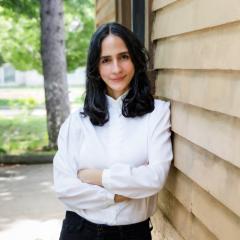Bruni Pizarro: Documenting Puerto Rican climate refugees in New Haven
A few days after Hurricane Maria struck Puerto Rico, a single mother of two escaped the disaster that left Puerto Rico in chaos and without electricity. Through her informal social networks, and with only a three-hour notice, she and her family boarded a humanitarian plane with a western physician and patients from the local hospital.
She spoke to me about how she didn’t ask to come to the mainland but that this is where she wants to stay. And she fears the hurricane that is to come.
I have followed her and several other families on this journey, where climate change-induced disaster has resulted in forced migration. Through an ethnographic lens, my aim is to understand how climate refugees from Puerto Rico meet the demands of their daily life as they make New Haven, Connecticut, their new home.
This includes how their perceptions and values are negotiated and understood on the mainland. It is through this lived experience that we can understand the downstream effects of climate change on marginalized populations. Integral to this framework, is understanding how urban centers are equipped to support climate refugees.
This work can contribute to a body of knowledge of the Puerto Rican transnational experience, migration, disaster, climate change and US race relations.
